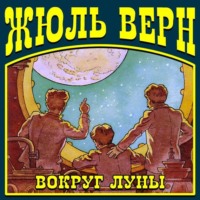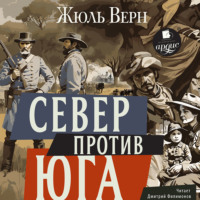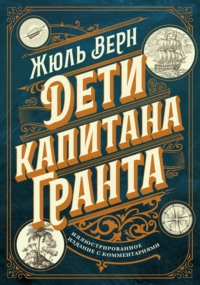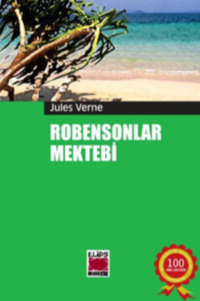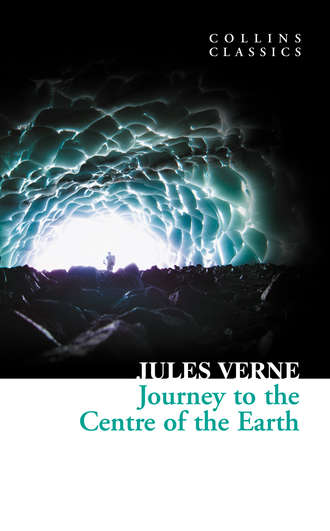
Полная версия
Journey to the Centre of the Earth
These were very fair conclusions, I thought.
“But what language is it?”
Here I looked for a display of learning, but I met instead with profound analysis.
“This Saknussemm,” he went on, “was a very well-informed man; now since he was not writing in his own mother tongue, he would naturally select that which was currently adopted by the choice spirits of the sixteenth century; I mean Latin. If I am mistaken, I can but try Spanish, French, Italian, Greek, or Hebrew. But the savants of the sixteenth century generally wrote in Latin. I am therefore entitled to pronounce this, à priori, to be Latin. It is Latin.”
I jumped up in my chair. My Latin memories rose in revolt against the notion that these barbarous words could belong to the sweet language of Virgil.
“Yes, it is Latin,” my uncle went on; “but it is Latin confused and in disorder; ‘perturbata seu inordinata,’ as Euclid has it.”
“Very well,” thought I, “if you can bring order out of that confusion, my dear uncle, you are a clever man.”
“Let us examine carefully,” said he again, taking up the leaf upon which I had written. “Here is a series of one hundred and thirty-two letters in apparent disorder. There are words consisting of consonants only, as nrrlls; others, on the other hand, in which vowels predominate, as for instance the fifth, uneeief, or the last but one, oscibo. Now this arrangement has evidently not been premeditated; it has arisen mathematically in obedience to the unknown law which has ruled in the succession of these letters. It appears to me a certainty that the original sentence was written in a proper manner, and afterwards distorted by a law which we have yet to discover. Whoever possesses the key of this cipher will read it with fluency. What is that key? Axel, have you got it?”
I answered not a word, and for a very good reason. My eyes had fallen upon a charming picture, suspended against the wall, the portrait of Gräuben. My uncle’s ward was at that time at Altona, staying with a relation, and in her absence I was very downhearted; for I may confess it to you now, the pretty Virlandaise and the professor’s nephew loved each other with a patience and a calmness entirely German. We had become engaged unknown to my uncle, who was too much taken up with geology to be able to enter into such feelings as ours. Gräuben was a lovely blue-eyed blonde, rather given to gravity and seriousness; but that did not prevent her from loving me very sincerely. As for me, I adored her, if there is such a word in the German language. Thus it happened that the picture of my pretty Virlandaise threw me in a moment out of the world of realities into that of memory and fancy.
There looked down upon me the faithful companion of my labours and my recreations. Every day she helped me to arrange my uncle’s precious specimens; she and I labelled them together. Mademoiselle Gräuben was an accomplished mineralogist; she could have taught a few things to a savant. She was fond of investigating abstruse scientific questions. What pleasant hours we have spent in study; and how often I envied the very stones which she handled with her charming fingers.
Then, when our leisure hours came, we used to go out together, and turn into the shady avenues by the Alster, and went happily side by side up to the old windmill, which forms such an improvement to the landscape at the head of the lake. On the road we chatted hand in hand; I told her amusing tales at which she laughed heartily. Then we reached the banks of the Elbe, and after having bid good-bye to the swans, sailing gracefully amidst the white water lilies, we returned to the quay by the steamer.
That is just where I was in my dream, when my uncle with a vehement thump on the table dragged me back to the realities of life.
“Come,” said he, “the very first idea which would come into any one’s head to confuse the letters of a sentence would be to write the words vertically instead of horizontally.”
“Indeed!” said I.
“Now we must see what would be the effect of that, Axel; put down upon this paper any sentence you like; only instead of arranging the letters in the usual way, one after the other, place them in succession in vertical columns, so as to group them together in five or six vertical lines.”
I caught his meaning, and immediately produced the following literary wonder:

“Good,” said the professor, without reading them, “now set down those words in a horizontal line.”
I obeyed, and with this result:
IyIoau IoIwrb ou,nGe vwmdrn eeyea!
“Excellent!” said my uncle, taking the paper hastily out of my hands. “This begins to look just like an ancient document; the vowels and the consonants are grouped together in equal disorder; there are even capitals in the middle of words, and commas too, just as in Saknussemm’s parchment.”
I considered these remarks very clever.
“Now,” said my uncle, looking straight at me, “to read the sentence which you have just written, and with which I am wholly unacquainted, I shall only have to take the first letter of each word, then the second, the third, and so forth.”
And my uncle, to his great astonishment, and my much greater, read:
“I love you well, my own dear Gräuben!”
“Hallo!” cried the Professor.
Yes, indeed, without knowing what I was about, like an awkward and unlucky lover, I had compromised myself by writing this unfortunate sentence.
“Aha! you are in love with Gräuben?” he said, with the right look for a guardian.
“Yes; no!” I stammered.
“You love Gräuben,” he went on once or twice dreamily. “Well, let us apply the process I have suggested to the document in question.”
My uncle, falling back into his absorbing contemplations, had already forgotten my imprudent words. I merely say imprudent, for the great mind of so learned a man of course had no place for love affairs, and happily the grand business of the document gained me the victory.
Just as the moment of the supreme experiment arrived, the Professor’s eyes flashed right through his spectacles. There was a quivering in his fingers as he grasped the old parchment. He was deeply moved. At last he gave a preliminary cough, and with profound gravity, naming in succession the first, then the second letter of each word, he dictated me the following:
messvnkaSenrA.icefdoK.aegiiittamvrtnecertserrette.rotai sadva.ednecsedsadnelacartniiilvIsiratracSarbmvtabiled-mekmeretarcsilvcoIsleffenSnI.
I confess I felt considerably excited in coming to the end; these letters named, one at a time, had carried no sense to my mind; I therefore waited for the Professor with great pomp to unfold the magnificent but hidden Latin of this mysterious phrase.
But who could have foretold the result? A violent thump made the furniture rattle, and spilt some ink, and my pen dropped from between my fingers.
“That’s not it,” cried my uncle, “there’s no sense in it.”
Then darting out like a shot, bowling down stairs like an avalanche, he rushed into the Königstrasse and fled.
CHAPTER 4 The Enemy to be Starved into Submission
“He is gone!” cried Martha, running out of her kitchen at the noise of the violent slamming of doors.
“Yes,” I replied, “completely gone.”
“Well; and how about his dinner?” said the old servant.
“He won’t have any.”
“And his supper?”
“He won’t have any.”
“What?” cried Martha, with clasped hands.
“No, my dear Martha, he will eat no more. No one in the house is to eat anything at all. Uncle Liedenbrock is going to make us all fast until he has succeeded in deciphering an undecipherable scrawl.”
“Oh, my dear! must we then all die of hunger?”
I hardly dared to confess that, with so absolute a ruler as my uncle, this fate was inevitable.
The old servant, visibly moved, returned to the kitchen, moaning piteously.
When I was alone, I thought I would go and tell Gräuben all about it. But how should I be able to escape from the house? The Professor might return at any moment. And suppose he called me? And suppose he tackled me again with this logomachy, which might vainly have been set before ancient Œdipus. And if I did not obey his call, who could answer for what might happen?
The wisest course was to remain where I was. A mineralogist at Besançon had just sent us a collection of siliceous nodules, which I had to classify: so I set to work; I sorted, labelled, and arranged in their own glass case all these hollow specimens, in the cavity of each of which was a nest of little crystals.
But this work did not succeed in absorbing all my attention. That old document kept working in my brain. My head throbbed with excitement, and I felt an undefined uneasiness. I was possessed with a presentiment of coming evil.
In an hour my nodules were all arranged upon successive shelves. Then I dropped down into the old velvet arm-chair, my head thrown back and my hands joined over it. I lighted my long crooked pipe, with a painting on it of an idle-looking naiad; then I amused myself watching the process of the conversion of the tobacco into carbon, which was by slow degrees making my naiad into a negress. Now and then I listened to hear whether a well-known step was on the stairs. No. Where could my uncle be at that moment? I fancied him running under the noble trees which line the road to Altona, gesticulating, making shots with his cane, thrashing the long grass, cutting the heads, off the thistles, and disturbing the contemplative storks in their peaceful solitude.
Would he return in triumph or in discouragement? Which would get the upper hand, he or the secret? I was thus asking myself questions, and mechanically taking between my fingers the sheet of paper mysteriously disfigured with the incomprehensible succession of letters I had written down; and I repeated to myself: “What does it all mean?”
I sought to group the letters so as to form words. Quite impossible! When I put them together by twos, threes, fives or sixes, nothing came of it but nonsense. To be sure the fourteenth, fifteenth and sixteenth letters made the English word “ice”; the eighty-third and two following made “sir”; and in the midst of the document, in the second and third lines, I observed the words, “rota,” “mutabile,” “ira,” “nec,” “atra.”
“Come now,” I thought, “these words seem to justify my uncle’s view about the language of the document. In the fourth line appeared the word “luco,” which means a sacred wood. It is true that in the third line was the word “tabiled,” which looked like Hebrew, and in the last the purely French words “mer,” “arc,” “mère.”
All this was enough to drive a poor fellow crazy. Four different languages in this ridiculous sentence! What connection could there possibly be between such words as ice, sir, anger, cruel, sacred wood, changeable, mother, bow, and sea? The first and the last might have something to do with each other; it was not at all surprising that in a document written in Iceland there should be mention of a sea of ice; but it was quite another thing to get to the end of this cryptogram with so small a clue. So I was struggling with an insurmountable difficulty; my brain got heated, my eyes watered over that sheet of paper; its hundred and thirty-two letters seemed to flutter and fly around me like those motes of mingled light and darkness which float in the air around the head when the blood is rushing upwards with undue violence. I was a prey to a kind of hallucination; I was stifling; I wanted air. Unconsciously I fanned myself with the bit of paper, the back and front of which successively came before my eyes. What was my surprise when, in one of those rapid revolutions, at the moment when the back was turned to me I thought I caught sight of the Latin words “craterem,” “terrestre,” and others.
A sudden light burst in upon me; these hints alone gave me the first glimpse of the truth; I had discovered the key to the cipher. To-read the document, it would not even be necessary to read it through the paper. Such as it was, just such as it had been dictated to me, so it might be spelt out with ease. All those ingenious professorial combinations were coming right. He was right as to the arrangement of the letters; he was right as to the language. He had been within a hair’s breadth of reading this Latin document from end to end; but that hair’s breadth, chance had given it to me!
You may be sure I felt stirred up. My eyes were dim, I could scarcely see. I had laid the paper upon the table. At a glance I could tell the whole secret.
At last I became more calm. I made a wise resolve to walk twice round the room quietly and settle my nerves, and then I returned into the deep gulf of the huge armchair.
“Now I’ll read it,” I cried, after having well distended my lungs with air.
I leaned over the table; I laid my finger successively upon every letter; and without a pause, without one moment’s hesitation, I read off the whole sentence aloud.
Stupefaction! terror! I sat overwhelmed as if with a sudden deadly blow. What! that which I read had actually, really been done! A mortal man had had the audacity to penetrate! …
“Ah!” I cried, springing up. “But no! no! My uncle shall never know it. He would insist upon doing it too. He would want to know all about it. Ropes could not hold him, such a determined geologist as he is! He would start, he would, in spite of everything and everybody, and he would take me with him, and we should never get back. No, never! never!”
My over-excitement was beyond all description.
“No! no! it shall not be,” I declared energetically; “and as it is in my power to prevent the knowledge of it coming into the mind of my tyrant, I will do it. By dint of turning this document round and round, he too might discover the key. I will destroy it.”
There was a little fire left on the hearth. I seized not only the paper but Saknussemm’s parchment; with a feverish hand I was about to fling it all upon the coals and utterly destroy and abolish this dangerous secret, when the study door opened, and my uncle appeared.
CHAPTER 5 Famine, then Victory, Followed by Dismay
I had only just time to replace the unfortunate document upon the table.
Professor Liedenbrock seemed to be greatly abstracted.
The ruling thought gave him no rest. Evidently he had gone deeply into the matter, analytically and with profound scrutiny. He had brought all the resources of his mind to bear upon it during his walk, and he had come back to apply some new combination.
He sat in his armchair, and pen in hand he began what looked very much like algebraic formulæ. I followed with my eyes his trembling hands, I took count of every movement. Might not some unhoped-for result come of it? I trembled, too, very unnecessarily, since the true key was in my hands, and no other would open the secret.
For three long hours my uncle worked on without a word, without lifting his head; rubbing out, beginning again, then rubbing out again, and so on a hundred times.
I knew very well that if he succeeded in setting down these letters in every possible relative position, the sentence would come out. But I knew also that twenty letters alone could form two quintillions, four hundred and thirty-two quadrillions, nine hundred and two trillions, eight billions, a hundred and seventy-six millions, six hundred and forty thousand combinations. Now, here were a hundred and thirty-two letters in this sentence, and these hundred and thirty-two letters would give a number of different sentences, each made up of at least a hundred and thirty-three figures, a number which passed far beyond all calculation or conception.
So I felt reassured as far as regarded this heroic method of solving the difficulty.
But time was passing away; night came on; the street noises ceased; my uncle, bending over his task, noticed nothing, not even Martha half opening the door; he heard not a sound, not even that excellent woman saying:
“Will not monsieur take any supper to-night?”
And poor Martha had to go away unanswered. As for me, after long resistance, I was overcome by sleep, and fell off at the end of the sofa, while uncle Liedenbrock went on calculating and rubbing out his calculations.
When I awoke next morning that indefatigable worker was still at his post. His red eyes, his pale complexion, his hair tangled between his feverish fingers, the red spots on his cheeks, revealed his desperate struggle with impossibilities, and the weariness of spirit, the mental wrestlings he must have undergone all through that unhappy night.
To tell the plain truth, I pitied him. In spite of the reproaches which I considered I had a right to lay upon him, a certain feeling of compassion was beginning to gain upon me. The poor man was so entirely taken up with his one idea that he had even forgotten how to get angry. All the strength of his feelings was concentrated upon one point alone; and as their usual vent was closed, it was to be feared lest extreme tension should give rise to an explosion sooner or later.
I might with a word have loosened the screw of the steel vice that was crushing his brain; but that word I would not speak.
Yet I was not an ill-natured fellow. Why was I dumb at such a crisis? Why so insensible to my uncle’s interests?
“No, no,” I repeated, “I shall not speak. He would insist upon going; nothing on earth could stop him. His imagination is a volcano, and to do that which other geologists have never done he would risk his life. I will preserve silence. I will keep the secret which mere chance has revealed to me. To discover it, would be to kill Professor Liedenbrock! Let him find it out himself if he can. I will never have it laid to my door that I led him to his destruction.”
Having formed this resolution, I folded my arms and waited. But I had not reckoned upon one little incident which turned up a few hours after.
When our good Martha wanted to go to Market, she found the door locked. The big key was gone. Who could have taken it out? Assuredly, it was my uncle, when he returned the night before from his hurried walk.
Was this done on purpose? or was it a mistake? Did he want to reduce us by famine? This seemed like going rather too far! What! should Martha and I be victims of a position of things in which we had not the smallest interest? It was a fact that a few years before this, whilst my uncle was working at his great classification of minerals, he was forty-eight hours without eating, and all his household were obliged to share in this scientific fast. As for me, what I remember is, that I got severe cramps in my stomach, which hardly suited the constitution of a hungry, growing lad.
Now it appeared to me as if breakfast was going to be wanting, just as supper had been the night before. Yet I resolved to be a hero, and not to be conquered by the pangs of hunger. Martha took it very seriously, and, poor woman, was very much distressed. ‘As for me, the impossibility of leaving the house distressed me a good deal more, and for a very good reason. A caged lover’s feelings may easily be imagined.
My uncle went on working, his imagination went off rambling into the ideal world of combinations; he was far away from earth, and really far away from earthly wants.
About noon hunger began to stimulate me severely. Martha had, without thinking any harm, cleared out the larder the night before, so that now there was nothing left in the house. Still I held out; I made it a point of honour.
Two o’clock struck. This was becoming ridiculous; worse than that, unbearable. I began to say to myself that I was exaggerating the importance of the document; that my uncle would surely not believe in it, that he would set it down as a mere puzzle; that if it came to the worst, we should lay violent hands on him and keep him at home if he thought on venturing on the expedition that, after all, he might himself discover the key of the cipher, and that then I should be clear at the mere expense of my involuntary abstinence.
These reasons seemed excellent to me, though on the night before I should have rejected them with indignation; I even went so far as to condemn myself for my absurdity in having waited so long, and I finally resolved to let it all out.
I was therefore meditating a proper introduction to the matter, so as not to seem too abrupt, when the Professor jumped up, clapped on his hat, and prepared to go out.
Surely he was not going out, to shut us in again! no, never!
“Uncle!” I cried.
He seemed not to hear me.
“Uncle Liedenbrock!” I cried, lifting up my voice.
“Ay,” he answered like a man suddenly waking.
“Uncle, that key!”
“What key? The door key?”
“No, no!” I cried. “The key of the document.”
The Professor stared at me over his spectacles; no doubt he saw something unusual in the expression of my countenance; for he laid hold of my arm, and speechlessly questioned me with his eyes. Yes, never was a question more forcibly put.
I nodded my head up and down.
He shook his pityingly, as if he was dealing with a lunatic. I gave a more affirmative gesture.
His eyes glistened and sparkled with live fire, his hand was shaken threateningly.
This mute conversation at such a momentous crisis would have riveted the attention of the most indifferent. And the fact really was that I dared not speak now, so intense was the excitement for fear lest my uncle should smother me in his first joyful embraces. But he became so urgent that I was at last compelled to answer.
“Yes, that key, chance—”
“What is that you are saying?” he shouted with indescribable emotion.
“There, read that!” I said, presenting a sheet of paper on which I had written.
“But there is nothing in this,” he answered, crumpling up the paper.
“No, nothing until you proceed to read from the end to the beginning.”
I had not finished my sentence when the Professor broke out into a cry, nay, a roar. A new revelation burst in upon him. He was transformed!
“Aha, clever Saknussemm!” he cried. “You had first written out your sentence the wrong way.”
And darting upon the paper, with eyes bedimmed, and voice choked with emotion, he read the whole document from the last letter to the first.
It was conceived in the following terms:
In Sneffels Joculis craterem quem delibatUmbra Scartaris Julii intra calendas descende,Audax viator, et terrestre centrum attinges.Quod feci, Arue Saknussemm.*
Which bad Latin may be translated thus:
“Descend, bold traveller, into the crater of the jokul of Sneffels, which the shadow of Scartaris touches before the kalends of July, and you will attain the centre of the earth; which I have done, Arne Saknussemm.”
In reading this, my uncle gave a spring as if he had touched a Leyden jar. His audacity, his joy, and his convictions were magnificent to behold. He came and he went; he seized his head between both his hands; he pushed the chairs out of their places, he piled up his books; incredible as it may seem, he rattled his precious nodules of flints together; he sent a kick here, a thump there. At last his nerves calmed down, and like a man exhausted by too lavish an expenditure of vital power, he sank back exhausted into his armchair.
“What o’clock is it?” he asked after a few moments of silence.
“Three o’clock,” I replied.
“Is it really? The dinner hour is past, and I did not know it. I am half dead with hunger. Come on, and after dinner—”
“Well?”
“After dinner, pack up my trunk.”
“What?” I cried.
“And yours!” replied the indefatigable Professor, entering the dining-room.
*In the cipher, audax is written avdas, and quod and qusm, hods and hem. (Tr.)


